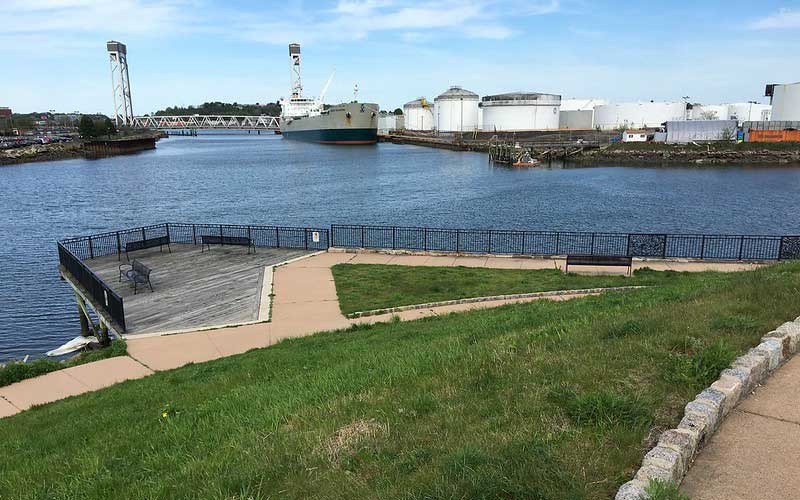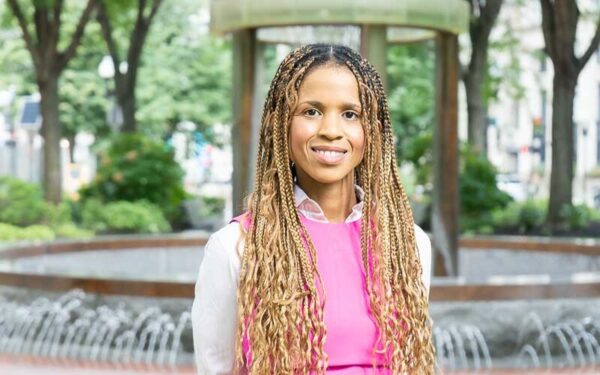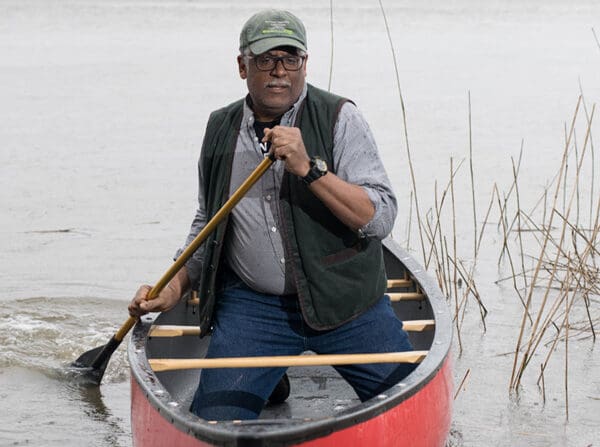
Despite widespread opposition from residents, Eversource is proceeding in its plan to build a massive electrical substation in East Boston on the banks of Chelsea Creek. The site sits feet away from a small nature preserve, a children’s playground, and the water itself. Residents worry about the safety of building such a project on a site often inundated by water.
The State’s decision to ignore resident concerns shows what happens when public participation occurs in name only. The issues with the project are manifold, from the environmental justice status of the community, potential safety and future flooding risk, and whether Chelsea and the surrounding community even need the substation to ensure future power reliability.
What’s more, residents with limited English abilities have been repeatedly left out of the conversation about this complex, flawed, and unwarranted project. The state plans to make its final ruling on the project on the evening of March 11, following a hearing in East Boston.
This Environmental Justice Community Doesn’t Need A Massive Industrial Facility
East Boston’s Eagle Hill is a quiet neighborhood. Triple deckers line its streets, alongside auto body shops and small grocery stores.
To the north, this mostly residential area borders Chelsea Creek. The rolling hills of the Condor Street Urban Wild offer a view of the water, with tarp-covered piles of salt framing the far bank. Hazardous contaminants live in the ground below, capped with layers of earth and greenery – a pristine image only achieved through the years-long efforts of neighborhood activists.
White cylindrical drums cast shadows downwards to the creek. Within them is the fuel that powers the jets that trace the clouds above. Not far away, children slide down playground equipment, and soccer balls stir up dust on the worn ground of a baseball diamond.
On the Everett side of the Mystic River watershed, ExxonMobil operates an oil storage terminal that, in 2006, spilled thousands of gallons of fuel into the creek. Even more severely, an oil spill of around 60,000 gallons occurred in the summer of 2000, following the collision of a tank vessel with a tugboat. Exxon and its fellow fossil fuel companies are responsible for both the global climate crisis and for the increased flooding on this riverbank, where storms are predicted to occur more frequently and severely.
Those who live nearby know the creek already swells during storms and heavy rainfall. Residents question the safety of living next to an electrical substation built on a site subject to inundation.
The entangled industrial histories inscribed on this landscape manifest in the lives of East Boston and Chelsea residents, who have lived alongside water and polluting forces for years. Too often, they have been unable to meaningfully influence the planning, siting, and regulatory processes that place hazards here.
An Already Complicated Process Was Made Incomprehensible to Many Residents
East Boston is a community of immigrants and their descendants. Over half of its households speak Spanish at home. Across the Chelsea Creek, around 70 percent of Chelsea residents speak a non-English language.
By law, decision-making for siting significant new energy infrastructure mandates public participation. The Siting Board and its parent agency, the Executive Office of Energy and Environmental Affairs, are legally required to ensure that limited English speakers can access information, services, programs, and opportunities. Yet, in its approval process for the substation, the Siting Board did not fulfill its obligations, consistently failing to provide adequate interpretation services. As a result, Spanish-speaking residents have been systematically left out of the process, rendering impossible meaningful public engagement.
The Siting Board Often Ignored Resident Concerns about Translation Services
Last July, the Siting Board heard from both Eversource and GreenRoots, a community group opposing the substation. All gathered in a nondescript hearing room at South Station, far from East Boston. The fifth-floor room was not marked or advertised as a public space.
The hearing officers sat facing an audience of mostly Eversource employees – unsurprising given that it was the middle of a weekday afternoon. A handful of residents from Eagle Hill gathered to learn about the future of their neighborhood.
Under fluorescent lights, attorneys for GreenRoots inquired about the site’s safety and the legality of its selection. They and Eversource’s lawyers shuffled through stacks of documents and made obscure references to pages the audience did not have themselves.
Even if they had, though, it would not have mattered. Of the thousands of documents generated over the five years since Eversource proposed the project, few have been translated into Spanish or Portuguese, languages often spoken in East Boston households.
The utility’s witnesses and representatives responded to queries in technical terms that would be hard to understand even if one’s first language was English. And, while a Spanish language interpreter was on hand, they skipped over the technical details of the case as they unfolded. The term “100-year flood” was translated as “la inundación y las tormentas seran en las cien años,” meaning “the flooding and the storms will occur in 100 years” – a misleading translation of the actual risk to the proposed facility. A reference to two Chapter 91 licenses, an environmental procedure required by the State, was translated as “hay dos documentos” or “there are two documents,” erasing reference to the actual content or context of the documents. Some sentences went entirely untranslated, and translation itself often lagged behind the proceedings.
Community members fluent in both English and Spanish pointed out these inaccuracies. Nothing was done to correct them.
The Massachusetts Siting Board Has a History of Providing Inadequate Translation in Public Hearings
Sadly, the July hearing marked an improvement. In November of 2017, translation services were denied outright to non-English speakers. The presiding officer deemed two-way interpretation “too disruptive” to the proceedings. Spanish testimony by residents was translated to the board, but the English proceedings were not translated back to residents.
The July 2019 hearing itself had been delayed after GreenRoots requested interpretation services. The Siting Board’s initial solution? Isolating non-English speakers in a different room for convenience.
These decisions negate the notion that public participation is essential to the siting process. That process should provide residents with vital information about any massive industrial project intended for their neighborhood. In this case, it has instead hindered participation by East Boston residents for years. And, though Eversource filed its initial petition with the State in 2014, no meeting occurred in East Boston until February 2019.
Already-Complex Procedures Should Not Be Made Even Harder for Those with Limited English
The siting process is already a complicated one for people who spend their days and nights working and caring for their families rather than studying siting law. Well-resourced utilities dictate the terms of projects and have the time, money, and expertise to move them forward. Language barriers make meaningful public participation even harder – as does the lack of regard for residents with limited English capacity.
In a case like the Eversource substation, where state approvals can hinge on questions such as whether the project is even needed or the proposed site is at risk of flooding, it is especially critical that residents fully understand the proceedings. (For the record, Eversource presented inaccurate information on both questions, using outdated energy demand projections for the region and considering a limited spectrum of flooding risks.)
In the Eversource case, the next hearing for the project, on March 11, will include simultaneous interpretation in Spanish and Portuguese. But this success comes only after repeated failures by the Siting Board.
Language Justice is Critical to a Fair Public Process
These failures by the Siting Board to properly include Chelsea and East Boston residents cannot be dealt with on a one-off basis, where interpretation is provided only following special petition or written complaints. The demand for accurate and reliable interpretation is part of a more significant issue of language accessibility within the Commonwealth, where 149,000 households statewide have limited English abilities, and around 1.5 million individuals speak a language other than English at home.
Language justice is essential to environmental and climate justice. All residents, regardless of native language, not only deserve to live, work, and play in environments free from risk and hazard, but also to have access to public proceedings and the information resulting from them. For communities like East Boston and Chelsea, where the land and communities bear both pollution burdens and climate risks, the need is especially vital.
East Boston Residents Haven’t Given Up the Fight
Even as we work with our partners to ensure that no other community has to fight for their right to be heard, the Eversource approval process is carrying on. And, while Eversource seems to view the substation’s approval as a foregone conclusion, East Boston residents are still using their voices to oppose it.
You can help. Voice your opposition to the project by:
- attending the Siting Board hearing on Wednesday, March 11, at East Boston High School (86 White Street, East Boston, MA 02128), from 5–9PM.
- emailing comments as an attachment to Siting Board’s Presiding Officer, Kathryn Sedor, at kathryn.sedor@mass.gov, to the Siting Board’s electronic docket at dpu.efiling@mass.gov, and to Eversource’s representative Catherine Keuthen at ckeuthen@keeganwerlin.com. Be sure to email all three and include your name, contact information, and the following docket information: EFSB 14-04/D.P.U 14-153/14-154.
- call or tweet Secretary Kathleen A. Theoharides, Secretary of Energy and Environmental Affairs and head of the Energy Facilities Siting Board, at 617.626.1000 x81015 or @ClimateKatie.




